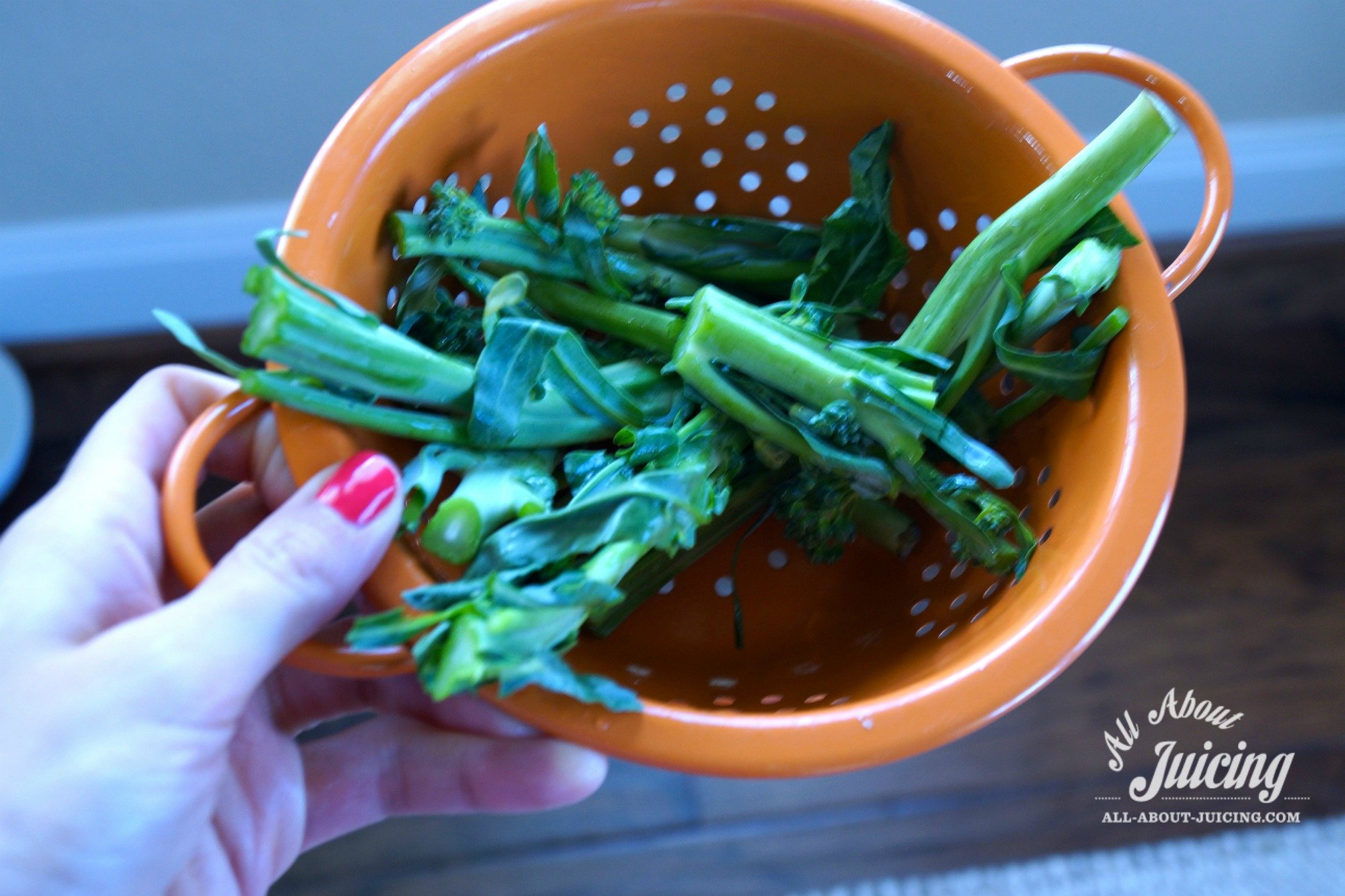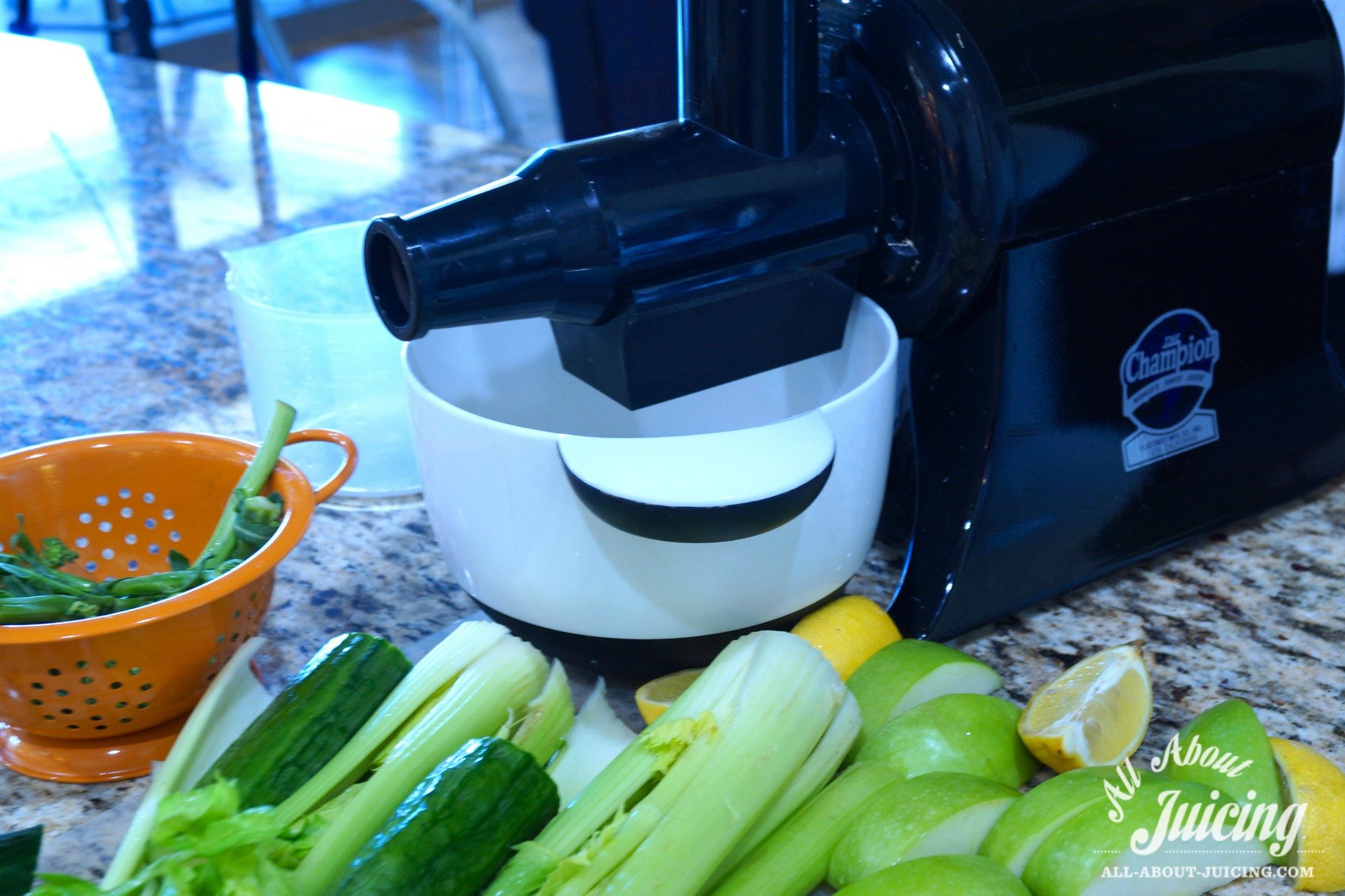[ad_1]
If you’re wondering how to juice broccoli I’ve got you covered. I’m a big fan of
broccoli, whether raw or steamed. But juiced? Not as much. I’m sure you’ll
agree that broccoli has a rather powerful flavor, one that becomes even more
intense when served in juice form!
Even if you don’t like to eat it, you should try to juice it. You can make it taste palatable, and it’s an easy way to incorporate it into your diet.

Benefits of broccoli
Broccoli is part of the
cruciferous vegetable family — the family of veggies that includes
cauliflower, brussel sprouts and kale – which are an important part of your
diet. Consuming these veggies can help prevent certain types of cancer, while
they also provide essential vitamins and nutrients. Broccoli is a rich source
of:
- Vitamin K: a ¾ cup of
broccoli has more than 100% of the daily recommended intake. Vitamin K helps
your blood coagulate and stimulates new bone development, protecting you from
bruising and bleeding. Vitamin K is also needed for your body to absorb
calcium, which helps keep your bones and teeth strong, while it also activates
proteins necessary for cell growth. - Vitamin C: A cup of broccoli juiced gives you your entire daily
intake! It’s about the same amount of Vitamin C as an orange. - Vitamin A: Broccoli is full of Vitamin
A, which is great for your eyes and helps fight cancerous cells. It also helps
promote healthy skin, breaks down urinary stones, and helps you maintain
healthy bones and teeth - Calcium: Broccoli has about the same amount of calcium as
whole milk, making it great for those who wish for all the benefits of calcium,
including strong bones and teeth! - Carotenoids: The
beta-carotene in broccoli breaks down into vitamin A, which helps you maintain
a healthy immune system. Broccoli also contains carotenoids called luten and
zeaxanthin, which help maintain healthy vision and protect your eyes from UV
damage. Carotenoids can also help prevent lung cancer, according to the Linus Pauling
institute. - Manganese: There’s manganese a-plenty in broccoli, which
activate antioxidant enzymes, which protect your cells from damage caused by
toxic by-products of your cellular metabolism. It also helps you process
nutrients, including proteins and carbohydrates, obtained from your diet, and
aids in bone development and wound healing. - B2/Riboflavin: This
great vitamin supports your immune system and helps your body deal with stress.
It also helps you process fat and protein, as well as helping your body process
B6 and folate into usable forms. If that’s not enough, it’s an antioxidant as
well, which helps fight free radicals that are created when your body breaks down food, and prevents aging. - Selenium: Broccoli also
contains significant amounts of selenium, a
mineral that fights cancer.
Tips on how to juice broccoli & make it taste good
How do you juice broccoli to make it taste good? Just like other dark greens, like kale, making broccoli juice palatable takes a certain finesse. Here’s how I’ve learned to make it better over the years. Keep these in mind when making your own broccoli filled recipes.
1. Don’t use too much broccoli in your recipe. A little goes a long way with broccoli, so start by only using a few florets or a few leftover stalks you have leftover from your meals.
2. Juice them with watery vegetables to dilute the flavor. My favorites are cucumbers and celery.
3. Add a neutralizing fruit or vegetable, like pear, apple or carrot. On top of adding sweetness, carrot juice provides you with extra vitamin A, vitamin K and potassium, while apple juice supplies the always-beneficial vitamin C. You can even add berries for some extra sweet flavor.
4. Incorporate herbs or roots into the recipe. Juicing fresh ginger or herbs, such as basil or mint, in your recipe help mask its distinctive grassy taste.
5. Add lemon or lime to your recipe. The acidity of lemon and limes also helps neutralize the bitterness of broccoli, while making it taste really refreshing.

Bold Broc Juice Recipe | serves 2-4
INGREDIENTS
1 bunch of broccolini (about 1-2 cups)
2 bunches of celery
2 medium cucumbers
1 lemon, peel on
1 large green apple, cored
DIRECTIONS
Cut all the produce to fit into your juicers chute. Juice the celery, cucumber, broccolini, lemon and apple. Mix gently to combine and serve.
Fun broccoli facts
- Its name, from the Italian word broccolo, relates to the flowering top of a cabbage – a tribute to its heritage.
- Broccoli is in fact a man-made food, a result of a mutation cultivated by the selective breeding of wild cabbage plants starting around the 6th century BC.
- Cross-breeding some of vegetables in the cruciferous
family have given rise to newer versions of broccoli. The broccoflower, for
instance, looks like a pale green-colored cauliflower yet still tastes a bit
like broccoli. Another vegetable, broccolini, is cross between broccoli and
Chinese kale which has a slightly peppery flavor. - Tom “Broccoli” Landers is a world champion
broccoli eater. He wolfed down one pound of broccoli in an incredible 92
seconds. - Thomas Jefferson, one
of the founding fathers of the United States, was a big fan of broccoli. He
planted the vegetable at Monticello as early as May 1767, importing the seeds
from Italy. - Although known as the
“golden state”, California produces 90% of America’s broccoli, so
perhaps golden is a misnomer for green! - Broccoli is the
reason the James Bond film series was brought to life. Mr. Albert R. Broccoli,
to be exact. This Italian-American is credited with bringing Ian Fleming’s
James Bond to film. Mr. Broccoli produced all of the Bond Films made during his
life and his heirs help continue the legacy. - While the US enjoys
their broccoli, with the average American eating 4
pounds a year according to the National Agricultural Statistics Service (USDA),
the US is only the third largest producer worldwide. China, producing over 8
million tons a year, comes in at no.1.
[ad_2]
Source link